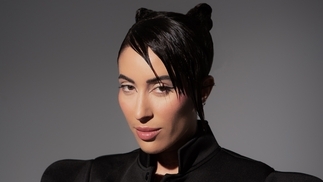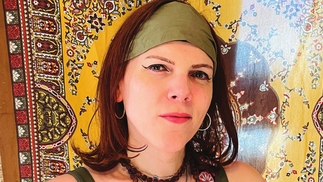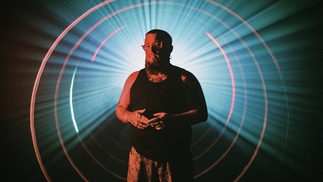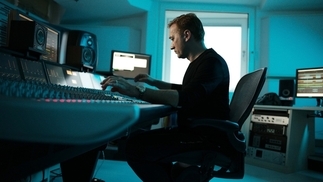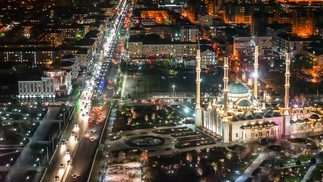PAUL VAN DYK: HOT SEAT
German trance legend Paul van Dyk, former winner of our Top 100 DJs poll, is in back-to-back meetings about his ‘Politics of Dancing 3’ album when we try to call him up, but he still manages to take his place in the Hot Seat for a wee chat with DJ Mag.

Three years in the making and brought to fruition in a different way to the previous two, it’s a worthy addition to PvD’s impressive discography of albums, mix-comps and quality melodic trance-tastic releases. ‘Politics of Dancing 3’ is out 4th May via Ultra Music/New State. Pre-order it here: www.thepoliticsofdancing.com
Hi Paul, you're about to release your third 'Politics of Dancing' mix CD, a decade after the second one...
“I am. It’s a pivotal release, which moves ‘Politics’ on from being a mix-comp to one that’s far more artist album in nature.”
What makes it a 'Politics of Dancing' mix, as opposed to a general mix CD?
“The way the music industry operates today is far different to how it was 10 years ago. Nowadays, you don’t have time to get music six months upfront in order to remix tracks, which is what I did with the previous ‘Politics’ releases from 10 or more years ago.
This time, instead of working out who I was going to remix tracks by, I did it by collaborating with the same people as I would have remixed. It’s an artist album in composition and more mix-comp-like in its sequencing and listening experience.”
How did you choose who to collab with?
“You have a lot of people on there who are part of the extended VANDIT family, in a way. There’s also a fair few producers who’ve I’ve been looking to work with for a while, for which ‘Politics 3’ provided the perfect opportunity. So you have people on there like Ummet Ozcan, Aly & Fila, Roger Shah & Giuseppe Ottaviani, singers/songwriters including Sue McLaren, Betsie Larkin, Tricia McTeague & Fisher and newer production talent like Genix, Jordan Suckley, Las Salinas and Mark Eteson.”
Why did you call the series 'The Politics of Dancing' in the first place?
“I became, how I think you would say, ‘politically-minded’ across a wide range of areas fairly early in my life. It was part of growing up in communist East Berlin. There was a natural juncture where the worlds of politics and dancing met and I decided to highlight that through the mix-album’s title.”
How is dancing political?
“The nature of the ‘Politics’ referred to are almost exclusively those of the diplomatic and social kind. In Ibiza, earlier in my life, I watched Palestinian and Lebanese friends of mine dancing side-by-side with Israeli friends — without war, without anything in their minds other than treating each other respectfully.
In a very small, personal aspect I saw what sort of potential this electronic music has for bringing people together. In my life since I’ve never seen any force that’s had a greater unifying effect. Getting people together is always the first step towards reconciliation. I have a hope that, in ways small and maybe even large, this new ‘Politics of Dancing’ music will edge us a step closer to that.”
Are you still involved in any charities or campaigning organizations now?
“Most certainly... I have my Rückenwind (which means ‘Tailwind’) charity, which engages in activities aimed at maintaining the thirst for knowledge in underprivileged children. Likewise, I’m still involved with the Indian-based Akanksha Foundation, the FEED project and the Peace One Day movement.”
A decade ago in DJ Mag you said, 'My mum always raised me to ask questions. She always said, Don't take things the way they are, always ask yourself why they are like that?' Should young people still question the status quo?
“Of course!”
Are you an Angela Merkel fan?
“No. She just follows events, then hops onboard whenever it is convenient.”

You started out putting on parties in East Germany just after the wall came down — what was so special about those early days?
“Well, I didn't put on my own parties — it was more a group of friends playing music in one of our homes. Electronic music as a form was still very new back then. Every new sub-genre or club opening or piece of studio kit coming on the market was like a revolution happening on top of a revolution, and that seemed to be (and actually was) occurring at an incredible pace.
That combined with the less-tribal open-mindedness of the time went a long way to creating a special vibe in the early days.”
The writer Richard Smith described the collective feeling on an ecstatic dancefloor as being like “a communism of emotions”. Does that resonate with you at all? “No, because communism to me means corruption, and somewhere where you have to leave your individuality at the door. The dancefloor to me means liberation, tolerance and respect — somewhere where you are what you are, as an individual.”
Trance has come back again now, hasn't it? What do you still love about it?
“From my perspective, music with trancey sounds has never gone away. People will always vote with their feet. If trance had ever been away, the first place you’d have seen that reflected would have been in the arenas and at the festivals. I’ve been playing melodic music to lots of people throughout the past few years.”
What else have you been up to lately?
“My focus recently has all been on finishing the production of ‘Politics 3’. It’s my first-ever exclusively collaborative album, working alongside 23 other producers, singers and songwriters. There were a lot of ‘moving parts’ and it took quite a long time to draw all of those threads together. It’s all done now, though! So from here it’s off into the tour; take the music out live and get to enjoy one of life’s greatest pleasures — watching people on the floor dancing to it.”
